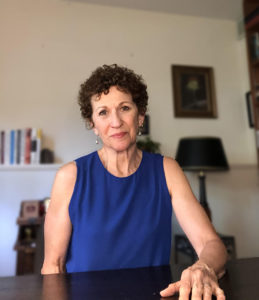PBI's Expert on the FSMB Sexual Misconduct Workgroup
PBI’s Expert on the FSMB Sexual Misconduct Workgroup
An interview with subject matter expert for the FSMB workgroup, Dr. Catherine Caldicott, Senior Faculty and Regulatory Liaison with PBI Education

Since its inception in 1912, the Federation of State Medical Boards (FSMB) has been charged with protecting public health by way of educating and supporting state medical and osteopathic boards around the US (About FSMB). In recent years, shocking cases of sexual misconduct among previously trusted and distinguished professionals have gained international attention, and the healthcare community was not immune. Thus, the FSMB’s decision to revisit their 2006 policy statement on addressing sexual boundaries, with the help of a Workgroup comprised of experts in the field, came at the right time. PBI Education’s Dr. Catherine Caldicott was invited to serve as subject matter expert on this Workgroup, based on her nearly 20 years of experience in healthcare professional ethics and boundary education, remediation, coaching, and research.
Interviewer: Can you share, in general, the purpose of this Workgroup?
Dr. Caldicott: Absolutely. The Workgroup had several purposes, among them:
- To review disciplinary data regarding physician sexual misconduct
- To identify and evaluate barriers to reporting sexual misconduct
- To evaluate the impact of state medical board public outreach on reporting
- To assess the prevalence of sexual boundary/harassment training in undergraduate and graduate medical education, and address any gaps
- To update the previous FSMB policy of 2006, titled “Addressing Sexual Boundaries: Guidelines for State Medical Boards”
Our final product was “Physician Sexual Misconduct: Report and Recommendations of the FSMB Workgroup on Physician Sexual Misconduct.” It was adopted as policy by the FSMB in May 2020.
Interviewer: And who did you work alongside in the Workgroup to accomplish all of these goals?
Dr. Caldicott: The Workgroup was created and led by Patricia King, MD, PhD, Chair at the time of the FSMB. Members included members of 10 state medical boards, individuals from the AMA, the AOA, the Federation of Medical Regulatory Authorities of Canada, the current Chair and Chair-elect of the FSMB, the President and CEO of the FSMB, two subject matter experts, and FSMB staff support.
Interviewer: That sounds like a diverse group. Tell us about your specific role on the Workgroup as a subject matter expert.
Dr. Caldicott: I was very pleased to be invited to serve as one of the two subject matter experts. During our first meeting I presented a talk titled, “Lessons from Participants and Regulators” that introduced the concept of a boundary violation being the end of a continuum of increasingly severe boundary “impingements,” and the PBI Boundary Formula©. This information was intended to familiarize Workgroup members with the processes that cause smart, highly educated, well-trained, and well-meaning clinicians to lose their way and commit sexual misconduct. My main contributions to the report itself were in the sections on remedial education, preventive education in medical school and residency, recidivism, and the use of chaperones.
Interviewer: I imagine it would be exciting to be able to share your unique remediation experiences with the other members in this setting. Can you share more about was it like to participate in the Workgroup?

Dr. Caldicott: It was a wonderful experience, and I was honored to be invited! I did not know most of the other members previously. All of them approached our task with so much thoughtfulness, care, and dedication, and contributed their considerable experience, that I truly appreciated the opportunity to engage with and learn from them. Other stakeholders were invited to attend our meetings as well, and they enlarged our perspective on our task even further. I got a good lesson from the Workgroup Chair and FSMB staff in how to organize and steer a chorus of many voices with skill and patience.
Interviewer: It does take great skill and organization on all sides to achieve the ambitious goals that you told us about earlier. Can you tell us what the main differences are between the 2006 Report and the 2020 Report?
Dr. Caldicott: The 2020 Report includes a number of issues and topics that were not covered in the 2006 Report. For example:
- It calls for change in the culture of medical education and practice to no longer permit sexual harassment and misconduct.
- It provides potential solutions, strategies, and best practice recommendations for state medical boards to consider.
- It advocates for an educational focus to change and improve culture, awareness, and behaviors across the continuum of medical education and practice.
- It uses different language. In the 2006 Report, the term “sexual boundary violation” was used to encompass everything from isolated instances of inappropriate communication to sexual misconduct to sexual assault. The Workgroup felt this was overly broad, and preferred “sexual misconduct” to refer to behavior that exploits the physician-patient relationship in a sexual way. “Sexual assault” was used for any type of sexual activity or contact without consent and, as such, is a criminal or civil violation that should be reported to law enforcement.
- It includes new sections on patient rights and expectations, complaints and the duty to report, trauma-informed investigations, remediation, transparency of board actions, education of board members and staff, and patient education.
Interviewer: All highly important changes. That’s quite impressive. And of these, what would you say are some key implications of the 2020 Report for state medical and osteopathic boards?

Dr. Caldicott: Among the many excellent recommendations, I would like to highlight these:
- That the culture of medical training and practice should no longer tolerate harassment of any type
- That state medical boards and the FSMB should work together to develop consistent terminology for use in board actions that allows greater public understanding, as well as improved tracking of recidivism and the impact of remedial measures
- That investigators should use trauma-informed procedures when interviewing and interacting with complainants, and other board members and staff who work with complainants should undergo training in victim trauma and implicit bias
- That chaperones should be appropriately trained and not have a pre-existing relationship with the physician they are monitoring
- That education and training about professional boundaries and physician sexual misconduct should be provided during medical school, residency and throughout practice. This would include renewed education on professionalism and the promotion of a culture of professionalism.
Interviewer: Dr. Caldicott, thank you so much for your time today and for the important work you do nationally to advance the conversation surrounding physician sexual misconduct.
Dr. Caldicott: It was my pleasure!
Click here to read the entire 2020 report
Citation:
“About FSMB.” Federation of State Medical Boards, https://www.fsmb.org/about-fsmb/.
